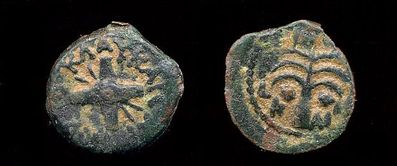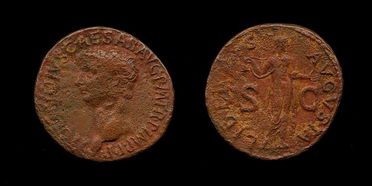Coin of Antonius Felix. Judaea, Caesarea Maritima, bronze prutah, 17 mm. We are getting to the end of the coins I have to illustrate Paul’s life. This prutah was a common coin of the era and place. It was issued by Felix in the name of Claudius and was minted in Jerusalem in 54 A.D. It features two oblong shields with spears crossed, and on the reverse a palm tree. It would have been used throughout that part of Judaea under direct Roman control. It is the last coin in my collection from the provinces. The next and last coin will be an imperial issue depicting the late emperor Claudius.
Up to this point we did not even know that Paul had a sister, much less that she was resident in Jerusalem! The same situation ensues in Caesarea; Felix brings Paul to face his Jewish accusers, they have nothing substantial to bring as charges against him, but demand he be executed anyway. The Roman-in-charge finds nothing wrong with Paul but orders him kept as a prisoner anyway - for two years! Basically Felix wants nothing to do with Paul and passes him on to the next governor Porcius Festus.
I have always wondered why Felix didn’t simply release Paul and tell him to “get out of Dodge”. We are told by the author of Acts that Felix secretly hoped that if he kept Paul, Paul would pay him a bribe to be released. That might be plausible for a short period of time, but for two years?? It appears that the author of Acts simply does not know what happened to Paul in this part of the story and is suggesting as factual events some surmises he has. Regardless, Paul is kept at Caesarea for two years awaiting ‘further developments’; actually awaiting the new governor Porcius Festus. Now, this could be an excellent time to use an historical personage in dating this part of Paul’s life. Unfortunately the date of the beginning of Festus’ governorship is not known exactly.
Festus does not know what to do with Paul either. He asks Paul if he wishes to be tried in Jerusalem before the Jews but Paul says no, that he wants to appeal his case to Caesar! Festus says, “You have appealed to the emperor; to the emperor you will go” (Acts 25:12b). But then before anything else happens, Festus asks Rome’s client king Agrippa II to interview Paul. King Agrippa can’t find anything against Paul either and makes the following ironic pronouncement, “This man could have been set free if he had not appealed to the emperor” (Acts 26:32).
FOURTH MISSIONARY JOURNEY 59-62 A.D. ROME
59 A.D. En route to Rome
“When it was decided that we were to sail for Italy, they transferred Paul and some other prisoners to a centurion of the Augustan Cohort, named Julius. Embarking on a ship of Adramyttium that was about to set sail to the ports along the coast of Asia, we put to sea…”. Acts 27:1-2b
So, Paul is on his way to Rome at last: perhaps not as he might have planned, but on the way nonetheless. Frankly, I think that Paul miscalculated here. The absolutely last emperor that I would want to judge my case would be Nero! (Nota Bene: Adramyttium was a port just to the east of Assos - and perhaps larger as well; it appears so on my map).
Now that we are at sea again, the “we” narrative recommenses as does the increased detail and more straightforward narrative. We might begin to think that the author of Acts was in fact a sailor. What follows is a hair-raising adventure with storms and shipwrecks and a three month sojourn on the island of Malta. From there Paul caught a ship to Italy, calling at Syracuse on the isle of Sicily, Puteoli on the bay of modern day Naples, and finally to Rome herself, the capital of the great Roman empire that Paul had lived in all his life.
60-62 A.D. Rome
Coin of Claudius. Imperial Rome, copper As, 29 mm. This is as good an introductory coin as any to use as our illustration of a coin Paul would certainly have seen during the two years he was kept at house arrest in Rome, awaiting his interview with Nero. The assarion or “as” was a standard sized denomination in the Roman system of imperial coinage, four of which made a sestertius (N.B.: four sestertii equaled one silver denarius).
These coins were typically used by the emperors as a means of informing the public or performing outright propaganda. This as features on the obverse a portrait of the late emperor Claudius who had died in 54 A.D. (succeeded by his great-nephew Nero). The reverse shows a figure depicting the goddess Libertas.
The Book of Acts comes to its close at this point, stating only that Paul stayed for two whole years in Rome in his own rented house and welcomed all who came to see him (Acts 28:30). The author of Acts does not say what happened after this, or if he eventually saw the emperor. One tradition has it that Paul was found guilty at his hearing and was beheaded by Nero’s judgment of death. Another tradition supposes that Paul was acquitted and left Rome, eventually traveling, as he had wanted to, to the west, to Spain. Still others say that he was acquitted the first time in 62 A.D. but after two years of further work, he was brought back to Rome to stand trial a second time and was killed in 64 A.D. We simply do not know.
So, we come to the end of this treatment of Paul’s activities, journeys and adventures as he followed the directive given to him to take the Gospel of Christ Jesus to the gentiles. I believe that by any standard used he was tremendously successful!
Written and researched by Breck Breckenridge
November 2010 to February 2011
(Page 10)


